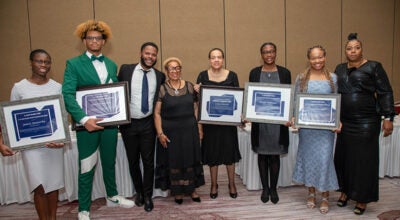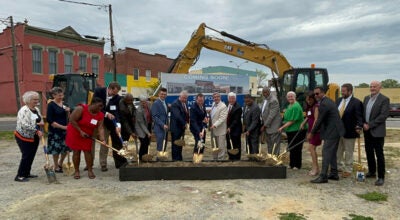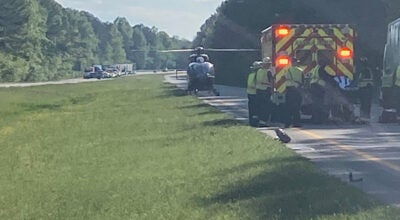Developers, farmers debate over solar facilities
Published 5:36 pm Tuesday, February 21, 2023
|
Getting your Trinity Audio player ready...
|
Debate over two companion ordinances for Conditional Use Permits that would establish solar energy facilities on the northern and southern areas of Indian Trail helped lengthen City Council’s Feb. 15 meeting to nearly five hours.
The Planning Commission previously recommended approval for both ordinances on a 7-0 vote. City Council ended up approving just one.
“These are two conditional use permit applications to establish solar facilities on parcels located on the opposite sides of Indian Trail, just northeast of Ruritan Boulevard,” Kevin Wyne said during the meeting. “The proposed facilities include a five megawatt facility that’s the larger facility on the south of Indian Trail and a smaller facility three megawatts on the northern side.”
Speaking in favor was CVE North America Senior Business Developer Carson Weinend on behalf of the applications.
“We sought these sites specifically because of where they were located in the city and their existing conditions,” Weinend said. “These sites are on the outskirts of town, near the city limits, they’re not visible for many major roadways.”
He told council the sites are perfectly flat in elevation, with no vantage point surrounding these properties that look into or up to it.
“They’re previously cleared,” Weinend said. “We don’t have to cut down trees, and they’re surrounded by existing vegetation, so our projects will be cited on these cleared areas, surrounded by tall existing dense vegetation on three of the four sides. There’s only a couple of strips where the solar facilities will be exposed to Indian Trail and those areas we are screening.”
In opposition to the rezoning, Suffolk resident and farmer Mike Griffin shared his concerns that the solar facilities would affect the farmland.
“There are two underlying issues here,” Griffin said. “The first issue is the fundamental viability of shared community solar. The second issue is should we be consuming viable cropland for the installation of these facilities. To address either of these two issues responsibly, I think we owe it to future generations to consider all facets of losses, as well as any potential gains.”
He said Suffolk contains a little over 4,000 acres of freshwater lakes that are owned by Norfolk and Portsmouth.
“How many times in the last 50 years have we all wished that we had those resources back?” Griffin said. “I promise you all this — in the next 50 years, you’re going to wish we had this cropland back.”
Suffolk resident Chris Dove spoke on his confliction on the topic — supporting solar panels and clean energy while being concerned about how effective it leaves properties.
“I’d like to see a proffer submitted by the applicant that they would guarantee that they would clean up residue and return the land back to farm or continue and revitalize the solar panels so that they can be continued,” Dove said. “I don’t want to be stuck with a solar farm that’s no longer usable and we can’t use it for farmland as well.”
Resident Carlton Diggs said if this solar farm does go through, his home would be surrounded by a solar farm.
“No one’s mentioned what would become of that property, but I’m sure most people would not want to live in a solar farm,” he said. “No one’s mentioned if the solar panels are damaged, what happens with the chemicals in the solar panel. I have a well, is my well going to be contaminated?”
In rebuttal, parcel owner Ed Johnson said farmers would not have to worry about any issues of the solar facilities.
“These solar projects are the most non-invasive form of creating supplemental farm income there is,” Johnson said. “When the contract runs in course, the sites will be decommissioned at the cost of CVE and turned back to farmland at CVE’s expense.”
He went on to say Suffolk citizens are not going to pay for the infrastructure needed for this solar site.
“The actual cost of running power lines up and down Indian Trail for this site is going to be over half a million dollars to $800,000,” he added. “That’s on CVE’s dime, not the taxpayers. The farmers who are opposed to this, they are sending a clear message to their landlords. If you become sick, financial hardship, do you want to give a solar site to help your financial situation? Too bad. You’re evil, you’re bad. You can’t have that. I need the farmland to farm, but now you can’t benefit yourself.”
Councilmember Shelley Butler-Barlow praised Weinard’s project, but spoke in opposition due to concerns of unknown long-term impacts.
“My first argument is that agricultural land is already a solar collection facility, we’re collecting solar energy and we produce food and fiber. I think that’s an important fact. You’re not getting anymore green by going to solar from a farm. Farm is about the greenest energy that you can supply,” Butler-Barlow said. “I think that we don’t know enough about the environmental impacts of these facilities.”
She said they have not ever undone a solar facility.
“ I’ve been told by Dominion by several companies that ‘Oh, we’re going to take it all up and we’re going to put back to farmland,” she said, adding that no one has done that. She questioned whether it can be done.
“I asked somebody at Dominion ‘What’s the significance of the 20- to 25-year contract’ and I was told that that is when the technology will likely be obsolete, and then we’ll be on to something else,” she said. “So these are not lifelong projects, they’re short term until the technology changes again.”
Councilman Timothy Johnson also spoke in opposition to the project, but praised Weinard
“I agree with the gentleman that said what is it going to do to my land value. I wouldn’t live there,” Johnson said. “My experience with solar so far has been so not good, it makes it really difficult for me to think that it is the way of the future.”
The first ordinance failed on a 3-3 vote with on abstention, with Mayor Michael Duman, Vice Mayor Lue Ward and Councilman John Rector voting in favor, and Johnson, Butler-Barlow and Councilman Leroy Bennett voting against it. Councilman Roger Fawcett abstained.
During the hearing for the second ordinance, Weinard spoke in favor of the project.
“We feel that our application here is complete and we’ve taken measures to go above and beyond what’s required and prove that we are a good steward for the community. We’re a good partner for the City of Suffolk, and we want to do solar the right way,” Weinard said.
Ed Johnson also spoke again for approval.
“Nothing I say tonight is going to change the same vote, but I want all these landlords that are hopefully watching tonight, when your little farmer gets up here and says ‘Oh, how bad. How bad this is, it’s going to poison the ground. No. It’s not. It really is not,” Johnson said.
Duman said he didn’t know which way the council would vote on this second ordinance, but noted he believes they need to get a grip on it.
“If we need to take it off the books until after the retreat, then it would be my suggestion,” the mayor said. “I don’t know what we have to do to do that, just take it out of there and you cannot apply for a solar farm in the City of Suffolk until we get our act together.”
The second ordinance was approved on a 4-3 vote with Bennett, Butler-Barlow and Johnson voting against the ordinance.
Councilman LeOtis Williams was absent from the meeting and was excused.







